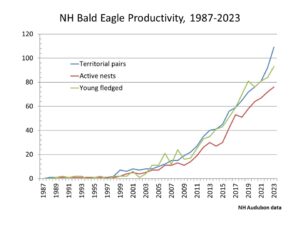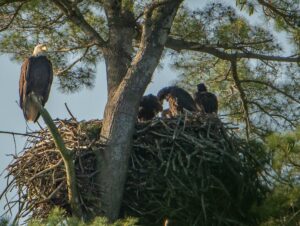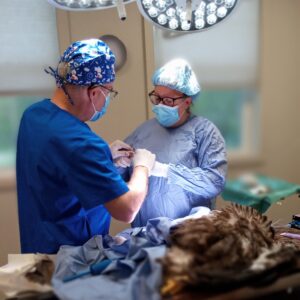(by Chris Martin)
In 2023, NH Audubon staff and field volunteers continued to track the robust resurgence of the Granite State’s Bald Eagle population. We confirmed 109 TERRITORIAL PAIRS in NH, up 18% compared to 2022. We documented 76 PAIRS INCUBATING, up more than 5% from 2022. We counted 61 SUCCESSFUL NESTS, and we tallied 93 YOUNG FLEDGED, the latter up nearly 11% over the 84 fledglings produced in 2022. This year’s breeding season totals for all categories set new state-record highs for the post-DDT era.
New Hampshire Fish & Game (NHFG) removed the Bald Eagle from our state’s Endangered and Threatened Wildlife List in March 2017 after we confirmed two decades of population growth. Looking back this was clearly the right decision, and the population has continued to expand since then. It is worth pausing to recall that just 25 years ago we were excitedly hailing the discovery of the state’s second nesting pair at Nubanusit Lake. Now, looking ahead to the 2024 breeding season, we have more than 100 territorial pairs and expect to surpass the milestone of 1000 eaglets fledged in NH since recovery began in the 1980s.
NH’s major rivers and larger lakes are now well-supplied with eagles. Currently 8 lakes, reservoirs, and bays in the Granite State support two or more breeding pairs; Winnipesaukee (11 pairs!), Umbagog (5), Great Bay/Little Bay (3), Lake Wantastiquet (3), Lake Francis (2), Moore Reservoir (2), Newfound (2), and Winnisquam (2). Working under a State Wildlife Grant (SWG) contract with NHFG, in 2019 we partitioned the state into 5 similar-sized eagle monitoring zones. In the Merrimack Valley zone, designated as our focal zone for 2023, we found 28 territorial pairs that produced 25 juvenile eagles. The Coastal zone will be our focal area in 2024.

In 2023, we found 5 nests that had 3 fledglings each, including a trio at Manchester’s Carthagina Island (see photo). This is the most 3-chick nests we have ever documented. In June 2023, we collaborated with scientists from Maine’s Biodiversity Research Institute (BRI) to collect blood and feather samples from 8 eaglets in 4 NH nests. BRI’s Chris Desorbo says that climbing a giant pine tree just once to get samples from 3 birds is a very efficient sampling methodology! Tissue samples will be analyzed to look for the presence of PFAS and other environmental toxins. While handling these birds, we also placed ID bands on them in hopes of relocating some of them again in future years.

NH Audubon continues to work with wildlife rehabilitator Maria Colby from Wings of the Dawn and veterinarian Dr. Michael Dutton and his team at clinics located in both Hopkinton and Weare. Among other incidents in 2023, they examined one adult eagle hit by a vehicle on I-93 in Concord, advised on treatment for a 1-yr old from Epsom with apparent rodenticide poisoning, and performed surgery on a juvenile from Lake Waukewan that had fractured a wing and a leg during a fall from the nest (see photo).
Our annual contract with NHFG covers only a portion of the monitoring and management work NH Audubon does with Bald Eagles. We depend on additional financial support from foundations, including from the Knopf Family Foundation and from individual donors, to continue to track eagles statewide. Please consider making a gift to sustain our work in the coming year. And thank you to all those individuals who volunteer their time and talents in the field to help us monitor eagles. NH Audubon would not be able to continue our statewide monitoring without your help!
